
Exploring Clips!Directions:Use the steps below to create a video while learning how to use the app Clips.
- Subject:
- Arts and Humanities
- Material Type:
- Activity/Lab
- Author:
- John Standerford
- Date Added:
- 03/25/2020

AEA K-12 E-Curriculum features content developed by AEA Learning Online and partnering Iowa educators for Iowa schools to use in their classrooms. This curated collection focuses on text-based lessons, specifically made with the SoftChalk Cloud platform.

Exploring Clips!Directions:Use the steps below to create a video while learning how to use the app Clips.
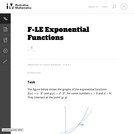
In this task students prove that linear functions grow by equal differences over equal intervals, and that exponential functions grow by equal factors over equal intervals.
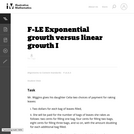
This problem illustrates how an exponentially increasing quantity eventually surpasses a linearly increasing quantity.

We learn about facts and opinions in elementary school. As we get older, however, sometimes the lines get blurred. For example, “I don’t like mayonnaise” is a fact. My opinion is that mayonnaise is gross. When developing an effective argument, it is important to know the difference between a fact, an opinion, and what’s just fiction (made up/fake). In this seminar, you will refresh your working knowledge of facts and opinions and, more importantly, understand their impact in written and spoken arguments.StandardsCC.1.2.9-10.H: Delineate and evaluate the argument and specific claims in a text, assessing the validity of reasoning and relevance of evidence.CC.1.4.9-10.C: Develop and analyze the topic with relevant, well-chosen, and sufficient facts, extended definitions, concrete details, quotations, or other information and examples appropriate to the audience’s knowledge of the topic; include graphics and multimedia when useful to aiding comprehension.CC.1.4.9-10.G: Write arguments to support claims in an analysis of substantive topics.

In 2016, Oxford Dictionaries chose "post-truth" as the word of the year. As literacy has shifted from published hardcopy to an online landscape, it is more important than ever to engage and empower students in navigating the complicated battleground of fake news verses responsible, fact-based news. In this multi-day lesson, students will 1) examine terms associated with “fake news” and evaluate sources for their reliability and authenticity, and 2) develop a set of norms for responsible use of online news sources that spans academic and personal interaction with media.Cover image: "Fake news" by pixel2013 from Pixabay.com
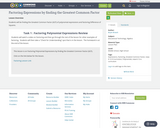
Students will be finding the Greatest Common Factor (GCF) of polynomial expressions and factoring Difference of Squares.

In this seminar you will learn how to factor polynomials by looking for a common factor. You will apply the concepts of factoring integers, as well as factoring monomials and looking for the greatest common factor among terms. The techniques learned in this seminar will allow you to factor polynomials with multiple terms, and find solutions using factoring.StandardsCC.2.2.HS.D.3Extend the knowledge of arithmetic operations and apply to polynomialsCC.2.2.HS.D.6Extend the knowledge of rational functions to rewrite in equivalent forms
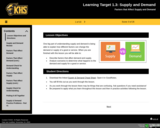
What factors impact demand and supply? This lesson gives an overview of different factors that impact demand and supply. There is also a practice assignment included at the end.
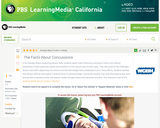
In this lesson designed to enhance literacy skills, students explore brain injuries called concussions: what they are, how they occur, the challenges in diagnosing them, and ways to protect yourself from them.
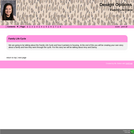
This SoftChalk is used to walk through the family life cycle as it pertains to housing. It tells what milestones can happen in this stage, and gives an examples of a family working through these stages.
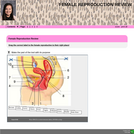
This is an review activity to help my students review the female reproduction system.
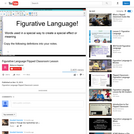
Figurative Language Flipped Classroom Lesson
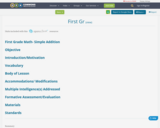
Student will show knowledge about simple addition through discussion and solving addition problems using a printable math mat with 100% accuracy.
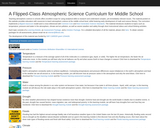
Members of the Department of Atmospheric Sciences at the University of Illinois Urbana-Champaign have designed a suite of atmospheric science learning modules for middle school students. The curriculum, which implements a flipped-classroom model, is cross-referenced with Common Core and Next Generation Science Standards. It introduces students to topics such as temperature, pressure, severe weather safety, climate change, and air pollution through short instructional videos and critical thinking activities. A goal of this project is to provide middle school science educators with resources to teach while fostering early development of math and science literacy. The work is funded by a National Science Foundation CAREER award. For a complete list of learning modules and to learn more about the curriculum, visit https://www.atmos.illinois.edu/~nriemer/education.html
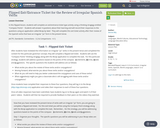
In this flipped lesson, students will complete an exit/entrance ticket type activity using a thinking stragegy entitled "Compass Points". Students will answer 4 questions about their learning and will record their responses to the questions using an application called Recap by Swivl. They will complete this exit ticket activity after their review of the Spanish verbs that have an irregular "yo" form in the present tense.(ACTFL Standards: Connections - 3.2 & Comparisons - 4.1)
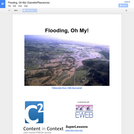
This is a 21 day unit on the topic of floods. Students will plan and prepare for what might happen in the event of a flood in our area. We have had floods in the past that have affected the Walterville School, its campus, and the surrounding areas. Using this as a springboard, students will discuss the effects of flooding, do research and interview family members who have experienced flooding, and then discuss possible ways to prevent significant damage on the buildings and surrounding areas. They will then design a barrier that could protect an area from damage for a period of time. Students will need materials to conduct experiments. We have listed these in the lesson plan. We have also included a trip to the Leaburg Dam so that students can learn about dams and their uses. We plan on teaching this unit in the fall.
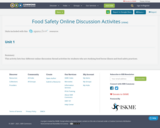
This activity lists four different online discussion thread activities for students who are studying food borne illness and food safety practices.
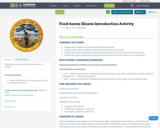
This lesson will introduce food borne illnesses to students.
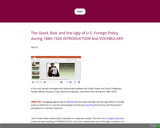
Determine the relationship between the United States and eight countries
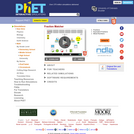
Match shapes and numbers to earn stars in this fractions game. Challenge yourself on any level you like. Try to collect lots of stars! The main topics of this interactive simulation include fractions, equivalent fractions, and mixed numbers.